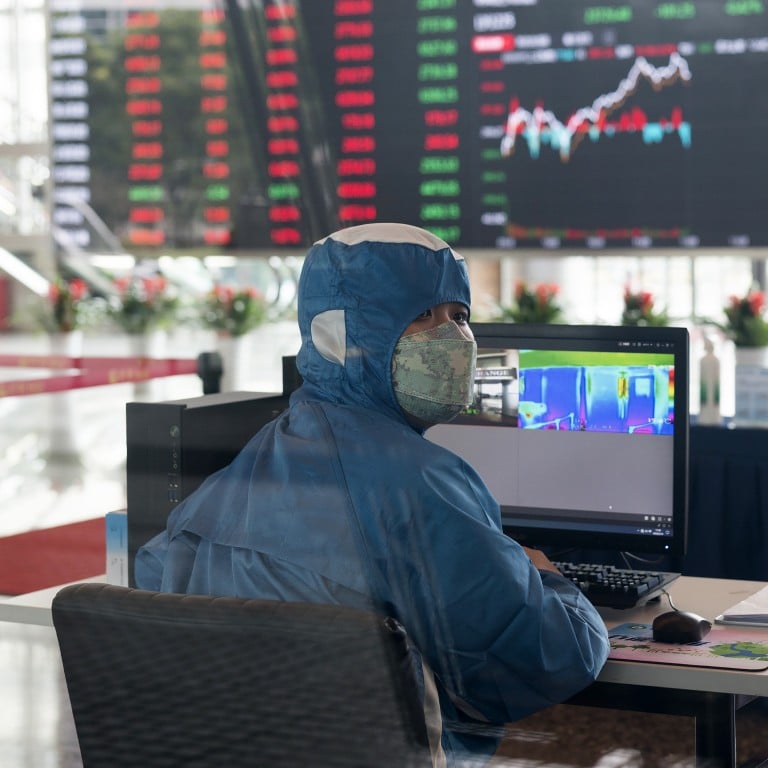
‘Sell on Friday’ is China stock traders’ hedge against coronavirus jitters and weekend blues
- Traders in China and Hong Kong unwind stock holdings preceding recent weekends to avoid uncertainty of the virus outbreak
- The Hang Seng Index fell on two out of the past three Fridays and CSI 300 Index dropped on one occasion of such trading days over the past two weeks
Dialling back risk appetite before the weekend appears to have some traction, going by trading patterns this year. The MSCI All Countries World Index has posted declines in five of the seven Fridays, after the killing of an Iranian top general on January 3. Investors avoided a 0.5 per cent loss on average on those occasions.
The Hang Seng Index has fallen in two of the past three Fridays since the Hong Kong market reopened after the Lunar New Year, suggesting traders are taking few chances. The CSI 300 Index, which tracks the nation’s biggest companies on the Shanghai and Shenzhen exchanges — has dropped in one of two Fridays since the onshore markets restarted on February 3.
“As the uncertainty increases, more people for sure will join the rank of selling shares on Fridays to shield from possible bad news on weekends,” said Chen Hao, a strategist at KGI Securities in Shanghai. “Investors are worried that there will be a resurgence in the disease outbreak.”
China’s stock market recuperates from coronavirus shock on containment, stimulus policies
Stocks in China and Hong Kong had largely been impervious to the jitters in global markets this year. A “phase one” deal as a tentative between Beijing and Washington has helped counter a sell-off as well as fuelled optimistic buying. Then came the coronavirus.
The outbreak has proved to be more contagious than the Sars (severe acute respiratory syndrome) outbreak that ravaged China and the rest of the world in 2003. It has infected more than 70, 000 people and killed at least 2,100 in mainland China, surpassing the tally in the previous epidemic.
The Chinese government has taken unprecedented containment measures, including locking down cities with a combined population of 50 million people, restricting the frequency of commuting, and shutting down factories and offices.
“The biggest risk is that the pandemic will be out of control and the economy will continue its slowdown,” said Dai Ming, a fund manager at Hengsheng Asset Management in Shanghai. “The situation seems to be improving in China. But as to when the virus will come under control in other countries, that remains unknown.”
The coronavirus may further induce a sense of trepidation on Fridays, much like when the global markets were gripped in the past by what China’s central bank would do during its policy tightening phase to cool an overheated economy.
China’s rise as an economic superpower had stoked risks associated runaway property prices, consumer inflation, and an unprecedented credit boom. More often than not, the People’s Bank of China delivered its monetary policy decisions over the weekends.
The sell-on-Fridays tactic has also played out during the US protracted trade war with China. When President Donald Trump tweeted on May 5, a Sunday, that he would more than double the tariffs on Chinese goods, traders became wary of weekend Twitter bombs.
The CSI 300 dropped in five of the eight Fridays following Trump’s threatening tweets. It remains to be seen if the coronavirus outbreak will perpetuate the Friday fright.
“Markets have been and will continue to be volatile in the near term given the rapid shifts in news flow around the human and economic toll of the virus,’’ said Howard Wang, head of Greater China equities at JPMorgan Asset Management in Hong Kong. “However, the outbreak will speed up certain structural trends that are already happening.”
Purchase the China AI Report 2020 brought to you by SCMP Research and enjoy a 20% discount (original price US$400). This 60-page all new intelligence report gives you first-hand insights and analysis into the latest industry developments and intelligence about China AI. Get exclusive access to our webinars for continuous learning, and interact with China AI executives in live Q&A. Offer valid until 31 March 2020.

